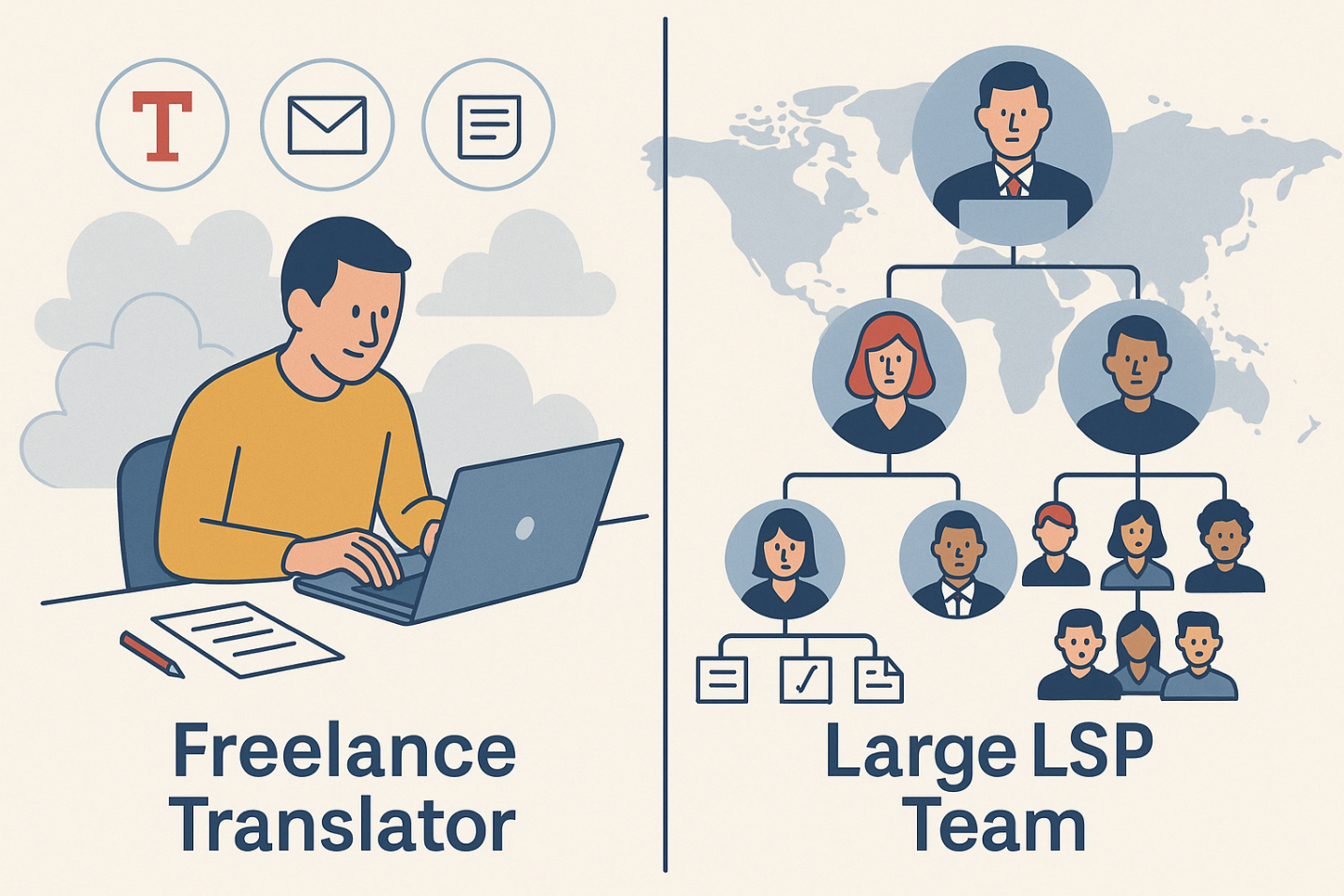
In modern society, it seems that almost any employable person can be a manager. As new jobs occur and already existing markets develop, the concept of “manager” becomes more and more broad—to the point that nowadays it’s not always clear what duties should be assigned to all the various kinds of managers that exist: finance managers, sales managers, purchases managers, and so on.
A project manager is an even more inscrutable job title, because all projects are different. What do they actually do? Receive orders and transfer them to vendors, or make decisions as a boss?
Let us gain some insight into this complex but vital role, in the context of a translation agency.
Project Manager Duties
Managers have different responsibilities in different translation agencies. In this regard, agencies are divided into two types:
In some companies, the processes provide that each task—interaction with the client, obtaining a project, tasks distribution between translators and editors, finance accounting, etc., is performed by a specific employee, typically a department head or management grade specialist. These employees usually have clearly defined duties and responsibilities. If the process is organized in such a way, there are no project managers at an agency, as there is no need for management at certain stages. In fact, only the head of an agency deals with the “real” management of implementing and controlling the successful functioning of a constructed architecture. This is the first management type.
If the head of a translation agency wants to delegate some of the managerial functions, then there is a need for a manager capable of working autonomously and making decisions at all stages. When a new order or project arrives, all the duties related exclusively to its execution are assigned to a designated project manager. They then have to determine vendors, deadlines, rates, method of work, and also monitor its accomplishment. Subsequently, a manager becomes autonomous, making decisions independently. This is the second management type.
The success of the first type of translation agency depends on the clarity of both the rules and instructions for all possible situations, as well as on corporate subordination. Actually, in this case you don’t need project managers at all. Instead, it’s important to equip the organizational structure with qualified specialists and monitor the accomplishment of instructions. In this case, the focus is more likely to be on the personal qualities of individual managers: leadership, quickness, independence, flexibility, etc.
How can you find a good project manager?
You can ask your HR-manager (such managers also exist), or take a closer look at a team of already hired translators and editors.
A project manager position can be one of the stages in the professional career of successfully working employees, who are ready to improve themselves and have the required personal qualities. The experience gained in performing translations is invaluable for building a team. A good manager is familiar with the process of translation and proofreading, programs, quality standards, etc., and at any time can take part of the task for themselves, reallocate jobs, agree on something with the client, etc.
On the other hand, a good translator does not always turn out to be a good manager. Often enough, during the “retraining” phase it becomes obvious that a newly promoted manager is not ready to take responsibility, contact clients, editors, and translators all the time, solve non-trivial issues, or even leave working on a favorite translation. Sometimes an agency loses an excellent translator and acquires quite an average project manager. This is a dramatic event. You can avoid it by carefully evaluating a candidate’s personal qualities, or by selecting project managers among those who work in similar positions for other companies.
At first glance, all projects are similar. Regardless of the previous position of a new manager, they have an idea of duties that will be assigned to them. However, the translation market is quite specific: in addition to the managerial functions, a project manager must quickly master numerous programs at a level sufficient to explain the nuances of working with them to others. They must also ensure compliance with certain standards, contact multiple clients, etc.
Another aspect is managing a huge, unfamiliar team. To build up a successful team, a project manager has to work well together with translators, editors, and other managers. A newcomer will have to be flexible in communication and building relationships. A translation agency therefore needs to carefully design the training and adaptation program for a newly-made manager.
Experience has proven that it’s not a good idea to combine managers “grown up” from translators with managers “from outside”, within one translation agency. Usually a company pursues one strategy, when hiring new employees.
Problems the Manager Deals With
Different clients have different requirements and expectations, so a project manager seldom executes a project by using a template. A task can initially seem simple: to receive files from a customer, transfer them to a translator and an editor, deliver an excellent translation to a client on time, record financial information, and then close the project. However, sometimes it can turn into a blockbuster plot!
Deadline Wrecking
It may seem that delaying a project by a few hours is not a big deal. However, nowadays the localization process involves a lot of people, and a text translated by an agency is quickly transferred to quality control specialists, editors on the client’s side, layout designers, etc. Therefore, a client expects their translation at a strictly fixed time. Failure at any stage of this process causes a whole chain of failures at all subsequent stages. A manager understands that any delay is a lost point. However, delays do occur from time to time.
Even trusted and responsible translators sometimes miss deadlines due to unforeseen circumstances (equipment failure, lack of electricity, etc.), let alone the newcomers. An experienced manager checks the reliability of “dark horses” on projects that allow delays and do not require special skills.
The inability of translators to gauge their strengths, the fear of recognizing a missed deadline, the disappearance of people without a translation done (usually freelancers have a tendency to do this)—these are the most unpleasant problems that a manager has to deal with. Reputation is extremely important for translation agencies, so managers prefer to cooperate with reliable translators.
Lack of Translators and Rush Jobs
You never know when a new customer order will come to you. Sometimes, after a month of sluggish routine, several large projects suddenly come at once. To execute them a manager requires a bigger than usual team of translators. Stress resistance and level-headedness can help a manager cope with this hectic rush.
Managers cannot accept the risk of a benchwarmer’s absence, so their responsibilities include engaging newcomers and training them. In addition, increasing the number of available translators allows the execution of more orders, so it’s usually a good perspective for a manager to have. A good translation agency always has freelance translators on standby. However, not all of them have time to survive an acid test before a big urgent project comes along.
New translators may not need serious training and may already have worked with the necessary programs. In this case, it’s enough to check the quality of their work via several smaller tasks with minimal risks, and if the result is positive, involve them in further projects. If the translator is a newcomer not only in a team, but also to the industry, a manager has to spend time and energy on explaining and setting up work processes.
Translation Quality Assurance
Yes, it’s also a project manager’s responsibility. No matter how the situation evolves, you have to deliver a high-quality end product to a client.
Quality complaints can arise from both a manager to a translator, and from a customer to a manager. All parties have to avoid conflicts in communication. If the quality of a translator’s work was not high; they should reasonably explain why it happened. If the claims arose from a client, then a manager should delicately find out what they are, determine if they are objective, and if so, politely explain what caused the drop in quality and what actions will be taken to avoid it in the future.
Technical Difficulties
Usually, translations performed in-house by agencies are done on computers and in specialized programs. However, both can sometimes fail. Due to an unexpected malfunction, a project’s completion time can increase dramatically. A manager should be ready to solve technical issues quickly and effectively, all alone or with the help of specialists.
Customer orders are often accompanied by specific instructions. Managers have to deal with them promptly, at a level sufficient to explain the working procedure to their subordinates. Thus, a manager’s performance directly depends on their technical knowledge and ability to learn quickly.
Awareness of Customer’s Requirements
To make a co-operation successful, managers must clearly understand what the client expects from them. It’s great if you have detailed instructions with an order, helping to execute it properly. However, it happens that strictly adhering to instructions does not improve, but conversely worsens the translation! A manager has to explain this to a client and ask them to revise some points of their instruction. If there are no clearly defined requirements, the situation becomes even more complicated: you have to use your intuition and create instructions from scratch.
Dealing With Finance Issues
Project profitability is one of the key aspects of a manager’s job. If there is a risk that a project may become unprofitable due to an unforeseen increase in costs, a manager should inform both the client and translator in good time. Some projects are non-profit by default, e.g. internal translations, jobs performed for reputation, test translations for prospective or highly demanding clients, etc.
Interaction With Other Managers
During hectic periods, several managers usually rush at the same time to enlist the same translators, especially the more competent ones. In this case, the most important thing is the ability to resolve conflicts and see the whole picture of the agency.
Delegating Responsibility
If, in addition to the project management responsibilities already discussed above, a manager takes on other jobs, e.g. translation, editing, proofreading, etc.—and this is especially true for those managers who were translators in the past, sooner or later they will burn out from an overabundance of work. While it’s true you can solve some issues quickly on your own, it’s often much more expedient to increase the competence of the team, delegate responsibility, and spend more time on managing than taking the whole work load on yourself.
Conclusion
Many people are not ready to make out-of-the-box decisions, take responsibility, and think flexibly. However, all these things are inevitable components of successful cooperation. A project manager’s job in a translation agency is essential. Their task is to organize a successful interaction between all participants of the translation process. If everything flows well, everybody is satisfied: translators, customers, an agency, and a manager as well.

.png)



